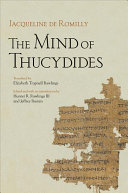

Most ebook files are in PDF format, so you can easily read them using various software such as Foxit Reader or directly on the Google Chrome browser.
Some ebook files are released by publishers in other formats such as .awz, .mobi, .epub, .fb2, etc. You may need to install specific software to read these formats on mobile/PC, such as Calibre.
Please read the tutorial at this link: https://ebookbell.com/faq
We offer FREE conversion to the popular formats you request; however, this may take some time. Therefore, right after payment, please email us, and we will try to provide the service as quickly as possible.
For some exceptional file formats or broken links (if any), please refrain from opening any disputes. Instead, email us first, and we will try to assist within a maximum of 6 hours.
EbookBell Team

4.8
44 reviewsThe publication of Jacqueline de Romilly’s Histoire et raison chez Thucydide in 1956 virtually transformed scholarship on Thucydides. Rather than mining The Peloponnesian War to speculate on its layers of composition or second-guess its accuracy, it treated it as a work of art deserving rhetorical and aesthetic analysis. Ahead of its time in its sophisticated focus upon the verbal texture of narrative, it proved that a literary approach offered the most productive and nuanced way to study Thucydides. Still in print in the original French, the book has influenced numerous Classicists and historians, and is now available in English for the first time in a careful translation by Elizabeth Trapnell Rawlings. The Cornell edition includes an introduction by Hunter R. Rawlings III and Jeffrey Rusten tracing the context of this book’s original publication and its continuing influence on the study of Thucydides.
Romilly shows that Thucydides constructs his account of the Peloponnesian War as a profoundly intellectual experience for readers who want to discern the patterns underlying historical events. Employing a commanding logic that exercises total control over the data of history, Thucydides uses rigorous principles of selection, suggestive juxtapositions, and artfully opposed speeches to reveal systematic relationships between plans and outcomes, impose meaning on the smallest events, and insist on the constant battle between intellect and chance. Thucydides’ mind found in unity and coherence its ideal of historical truth.